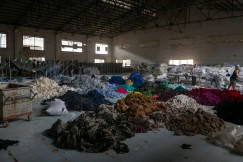Library
23 July 2025
VETting Green Policy Brief: Fighting Misleading Greenwashing Claims
Library
23 July 2025
Skills
Sustainable competitiveness
Textile
+2 more
Login / create an account to be able to react
-
8

The VETting Green consortium has developed a policy brief to empower consumers and companies in the footwear and apparel sectors to identify and avoid misleading greenwashing claims. Based on an industry survey, it highlights the need for training and stronger collaboration between stakeholders to support the circular transformation of the sectors.
European Confederation of the Footwear Industry
Topics
EU-27
Academic / Research and VET Institutions
Business Support Organisation
Consumer Organisations
Destination Management & Marketing Organisations
EU Institutions
Industry Associations and Chambers of Commerce
Networks and Federations / Confederations
-
Transition Pathway's building blocks
-
-
Skills
-
Sustainable competitiveness
-
-
Industrial ecosystems
-
-
Textile
-
-
Textiles ecosystem areas
-
-
Footwear
-
Business support and Communication
-
Share
The VETting Green consortium, composed of 6 partners across 5 countries, aims to empower consumers and companies in the footwear and apparel sectors to identify and avoid misleading greenwashing claims.
As a starting point for policy research on greenwashing, project partners developed a policy brief that guides companies through the latest EU legislation in this field. It includes the identification of successful cases on green claims communication and aims to highlight existing policies while pushing forward the development of new and more effectives ones.
This policy brief aligns with the European Commission’s strategy for a circular economy, which began in 2015 with the Circular Economy Action Plan, and continued through key initiatives such as the European Green Deal and the New Circular Economy Action Plan.
The document also presents insights from a survey conducted among companies in the footwear and apparel sectors on their engagement and practices in their circular transformation. It reveals that while many companies have started working towards sustainability, there is still a lack of knowledge regarding environmental legislation. Additionally, misleading environmental claims remain unclear for many companies.
It is therefore essential to provide both companies and their employees with the necessary training to:
• Prevent greenwashing;
• Understand sustainable legislation and its business implications;
• Implement ecodesign in product development;
• Communicate sustainability through credible and transparent ecolabels and certifications.
Addressing these needs requires strong collaboration between public authorities and private stakeholders to ensure compliance and build trust with consumers.
Comments (0)
See also
-
39
The EU’s 2024 Industrial Report reveals green and digital pathways for textiles transformation
- Categories
- Infrastructure Investments and funding R&I, techniques and technological solutions +16 more
-
60
Small mid‑caps: bridging the gap between SMEs and large companies
- Categories
- Infrastructure Investments and funding R&I, techniques and technological solutions +28 more
-
126
The EU’s vision for sustainable fashion: transforming the textiles sector by 2030
- Categories
- Infrastructure Investments and funding R&I, techniques and technological solutions +28 more





